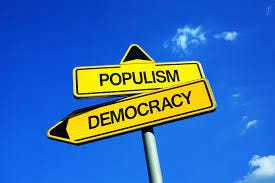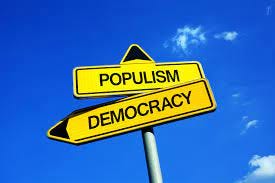The New Populist-Democratic Equilibrium and Its (Un)Stability
The Minimal Consensus in Western Liberal Democracies Has Definitively Shifted
The results of the recent Dutch and Argentinian elections have triggered several reactions suggesting that something has definitively changed in the Western contemporary political order. Take Tyler Cowen’s analysis:
“Wilders won resoundingly in the Netherlands, and polled much stronger after October 7. Yesterday there were anti-immigrant riots in Dublin, typically a relatively open city (most likely an Algerian migrant stabbed several people). The “far right” party in Austria is very popular, AfD is doing well in Germany, and France could flip. Italy already is there, noting that actual governance has not been so different under Meloni. The Sweden Democrats are part of the ruling coalition. That is a lot of the core EU group, plus Ireland and Sweden. And maybe I have forgotten somebody.
Note to media: Since they keep winning elections, or at least placing well, you can’t call them “far right” any more! How about “deep center”?”
Or consider New York Times columnist Ross Douthat:
“While popular discontents have undermined the neoliberal consensus of the 1990s and 2000s all across the developed world, the age of populism is creating very different alignments in the Latin American periphery than in the Euro-American core.
In Western Europe and the United States, you now consistently see a center-left party of the professional classes facing off against a populist and working-class coalition on the right. The center-left parties have become more progressive on economic policy relative to the era of Bill Clinton and Tony Blair, but they have moved much more sharply left on cultural issues while retaining their mandarin and meritocratic leadership, their neoliberal flavor. And they have mostly been able to contain, defeat or co-opt more radical left-wing challengers ...
The populist right, meanwhile, has often found success by moderating its libertarian impulses in order to woo downscale voters away from the progressive coalition, yielding a right-of-center politics that usually favors certain kinds of protectionism and redistribution. That could mean a Trumpian defense of entitlement programs, the halfhearted attempts by Boris Johnson’s Tories to invest in the neglected north of England or the spending on family benefits that you see from Viktor Orban in Hungary and the recently unseated populist coalition in Poland.
You can imagine the gulf between these two coalitions keeping the West in a state of simmering near crisis — especially with Trump’s crisis-courting personality in the mix. But you can also imagine a future in which this order stabilizes and normalizes somewhat and people stop talking about an earthquake every time a populist wins power or democracy being saved every time an establishment party wins an election.”
What is suggested here is that a new normality has emerged and that we should – and we will – stop being surprised or disturbed each time a populist performs well at elections or even wins office. Note especially Cowen’s notion of “deep center.” It puts words on this normalization. Traditionally, populist candidates and parties have been located at the far-right or the far-left. But over the last decade, these labels have become less and less relevant. Consider for instance the French example of the Rassemblement National. For decades, there was no issue putting this party (then called Front National) at the far right of the political spectrum. Its emphasis on the economic and cultural dangers of immigration was otherwise combined with a relatively classical form of economic liberalism, notably a disinterest in issues of economic inequalities, and a general preference for the retreat of the state from economic affairs. But this has radically changed over the last ten years. The party is by far now the most popular among low-income voters. This is not because these voters are racist or stupid. Primarily, this is related to the fact that the RN has been defending more redistributive policies and has virtually abandoned any form of economic liberalism that, correctly or not, is perceived by many as having adverse effects on the poorest.
You can still say that the RN belongs to the far-right for rhetorical purposes, but analytically speaking this is not correct. There are more affinities between the RN’s economic program and the one of the NUPES coalition than with Macron’s center-right party Renaissance. On the other hand, it has become increasingly difficult to dissociate the RN’s views on social and cultural issues from those of the “mainstream” right incarnated by the party Les Républicains. In other words, neither RN’s economic nor social views are “extreme” or “far” in any meaningful sense. They are located in different regions of the political space, but these regions are not “extreme” in the sense of violating the received political morality. You can still say that voters of Marine Le Pen or Eric Zemmour are racists. That may be true for some of them. But this is irrelevant, as Cowen notes in his post. As it happens, that may reflect that racism has been politically normalized. This is surely bad news from the “point of view of the universe.” But this is beside the point if you want to understand what is happening to Western liberal democracies. We are past the point where labeling people “racist” will be enough to change their minds.
Douthat’s article expresses similar ideas. Populist parties are playing the political game and, because of that, they have been pushed to make their economic views evolve toward more redistributive and protectionist policies. In the meantime, they have contributed to altering the rules of the democratic game by favoring a progressive change in our perception of what constitutes a “normal” or “acceptable” political discourse. The result is a new equilibrium where populist parties are essentially perceived as legitimate players playing against center-right and/center-left traditional parties that endorse a dose of economic liberalism and broadly defend universalist liberal values. What is unclear however is whether this equilibrium is stable.
In his analysis of the concept of public interest in a democratic context, Anthony Downs argues that a democratic regime, beyond the formal rules that determine who has the right to govern, rests on a minimal consensus consisting, roughly, (i) in a social and political morality determining what kind of behavior is to be expected from political actors[1] and (ii) a set of acceptable policies that meet criteria of reasonableness in light of the actual (scientific) knowledge and citizens’ values.[2] This minimal consensus is not immovable. It changes as social and political morality as well as people’s expectations about policies evolve. The claim is precisely that this minimal consensus has definitely changed and that we should not expect to return to the previous equilibrium. That doesn’t mean that the new minimal consensus will stay as it is, though.
Among the sources of instability, there is the scenario of extreme polarization that Douthat singles out as a threat in his column. In this scenario, center right and left parties would no longer be able to govern. Though this scenario is often pictured in terms of far-right against far-left, the picture would be probably more complicated. It would probably oppose parties according to whether or not nationality is seen as a politically relevant dimension. Note that in this scenario, identity politics would be pervasive because the main disagreement would be on which kind of identity matters. Moreover, at the economic level, (neo)liberalism would have largely disappeared from the picture.
Another source of instability comes from the fact that the process that I’ve emphasized above about the change of the prevailing political morality will not necessarily stop. Basically, it is no longer a political taboo to stigmatize foreigners and immigrants, to claim that elections are rigged even when we have strong reasons to think that they were fair, to claim without proof that elites are corrupted and are spreading fake news, to propagate oneself fake news without any shame, to refuse to concede political defeat and transmit power peacefully. All this is nowadays part of the political life in many liberal democracies and is essentially perceived as “normal,” as indicated by the fact that those who act along these lines perform well in polls or elections. There is no reason to believe that this must stop at this point. The next step is one where the results of elections are no longer perceived as legitimate, whatever they are because people no longer abide by the rule of the democratic game. For a democracy to work, you need notably to have a minimum trust in the elites that necessarily organize and ultimately adjudicate the democratic game. As far as populism is characterized as a general distrust toward elites, there are reasons to think that the emerging populist-democratic equilibrium is unstable because it cannot foster the needed minimal consensus.
Two remarks to conclude. If the analysis above is correct, that suggests that the very idea of “illiberal democracy” is wrong-headed. It would correspond to a political equilibrium that is unstable due to a lack of a corresponding minimal consensus. Modern representative democracy is born in the context of the liberal concern for the danger of tyranny – whether from a self-appointed autocrat, a monarch, or the majority. In this sense, representative democracy is tied to liberalism, defined as a doctrine (or corpus of doctrines) that affirms a family of political moralities that materializes in the democratic minimal consensus. Crack the liberal cement, and the democratic house will fall. Nonetheless, as Eric Schliesser’s essay on “Bonapartist democracy” marvelously shows, it may be true that the liberal democratic equilibrium was itself fragile from the start because it contains the seeds of its own destabilization. Basically, because democracy can be understood as the means of expression of the will of the people, an elected leader may be perceived as a more legitimate and adequate source of embodiment of this than a set of complex rules regulating the relationship between elected and non-elected elites. It is not a surprise that populism under all its forms, beyond its blind condemnation of elites, is also attached to a political style of leadership consisting of affirming the existence and the supreme legitimacy of the general will. The revival of this understanding of democracy is also part of the minimal consensus that underlies the new populist-democratic equilibrium. But we fear that this understanding, as the rest of the consensus, is self-undermining.
[1] For instance, the incumbent losing an election should peacefully leave the office.
[2] Anthony Downs, “The Public Interest: Its Meaning in a Democracy,” Social Research 29, no. 1 (1962): 1–36.




